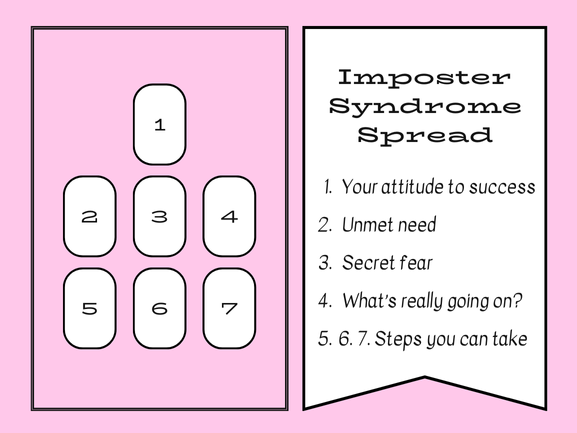
A tarot spread for those dealing with Imposter Syndrome
What is Imposter Syndrome?
The term Imposter Syndrome was first used by psychologists Suzanna Imes and Pauline Rose Clance in 1978. Whilst not a diagnosable condition, it can be a challenging psychological phenomenon that can unfortunately become self-fulfilling. That’s why it is well worth addressing. Ironically, it is usually highly accomplished people that suffer. Psychology Today states that up to 25-30% of high achievers may suffer with 70% of adults experiencing feelings of Imposter Syndrome at least once in their life. Web MD puts that figure as high as 82% of people.
Martin R Huecker et al define Imposter Syndrome as:
A behavioural health phenomenon described as self doubt of intellect, skills or accomplishments among high achieving individuals. These individuals cannot internalise their success and subsequently experience pervasive feelings of self doubt, anxiety, depression and/or apprehension of being exposed as a fraud in their work, despite verifiable and objective evidence of their successfulness.

Therefore, if you feel like an imposter there’s a good chance you are the exact opposite.
Let that sink in!
Types of Imposter Syndrome
A medically reviewed article published on Verywell Mind identifies five types of Imposter Syndrome:
- Perfectionist – The perfectionist has the belief that if the work is not perfect it could have, and should have, been done better.
- Expert – The expert is aware that they don’t know everything therefore they believe they are not as knowledgeable as people expect them to be. Therefore they are not good enough.
- Natural genius – This is when a person believes that if they do not understand something instantly they’re an imposter.
- Soloist – The soloist believes if you cannot achieve something on your own they are not competent.
- Superperson – The superperson needs to work the hardest and achieve more than others because otherwise people will realise they are a fraud.
Not only are these ways of thinking unsustainable, they are also untrue. However they create a negative feedback loop that can have ongoing impacts.
The potential impacts
- An inability to accurately assess abilities
- Believing any success is due to external factors
- Constantly criticising your performance
- Fear that you won’t be able to meet the expectations of others
- Overachieving leading to success at a cost to mental and/or physical health
- Self sabotaging behaviours to protect self-esteem
- Setting unreasonable goals followed by feelings of disappointment at not being able to achieve them
- Imposter Syndrome can manifest as over preparation or procrastination. Or, I’d say as a combination of the two. Over-preparation as a form of procrastination.
Obviously, over time, these are damaging to self-esteem and mental health and therefore it is important to address the causes, the associated feelings, and the actions associated with Imposter Syndrome. This is something close to my heart and I am only just becoming aware of the personal costs. Just doing the research and seeing the information laid out in front of me has been healing but I realise that in order to internalise it long term I needed to take additional steps. So, I created this spread to help me.

The Spread Positions
- Your attitude to success
- This card looks at how you feel about success and/or what it looks like to you.
- What need isn’t being met?
- This aims to establish what is missing for you that could serve as proof
- What are you secretly afraid of?
- This could be beliefs around success, failure, rejection etc
- What’s really going on?
- What is going on behind the scenes that may be triggering these feelings or what are they a reaction to?
- 6. 7. What steps can you take to address what you’ve uncovered?
It is best to journal your responses because it helps to get the thoughts out of your head and onto the page. This gives you an even better chance of gaining some clarity because you naturally start to order your thoughts when you write them down. Plus, it is harder to ignore blatant discrepancies in your thinking when it is right there in front of you. I know I go on and on about this but it is because I truly believe in the benefits of journaling.
Wrap up
My wish is that if you feel drawn to doing this spread for yourself, or you use it to help someone else, that it starts the healing process. Imposter Syndrome is not just a fancy label, it is a self actualising belief that can impact lives and prevent people from going after, and/or achieving, what they want and what they are capable of. It can impact work choices, relationships, how people approach tasks and how people feel about themselves overall. So please be kind to yourself and to others and take this very moment to recognise the value you add just by being you.
As a follow up, you may be interested in the I Am Enough spread which you can access by clicking here.





